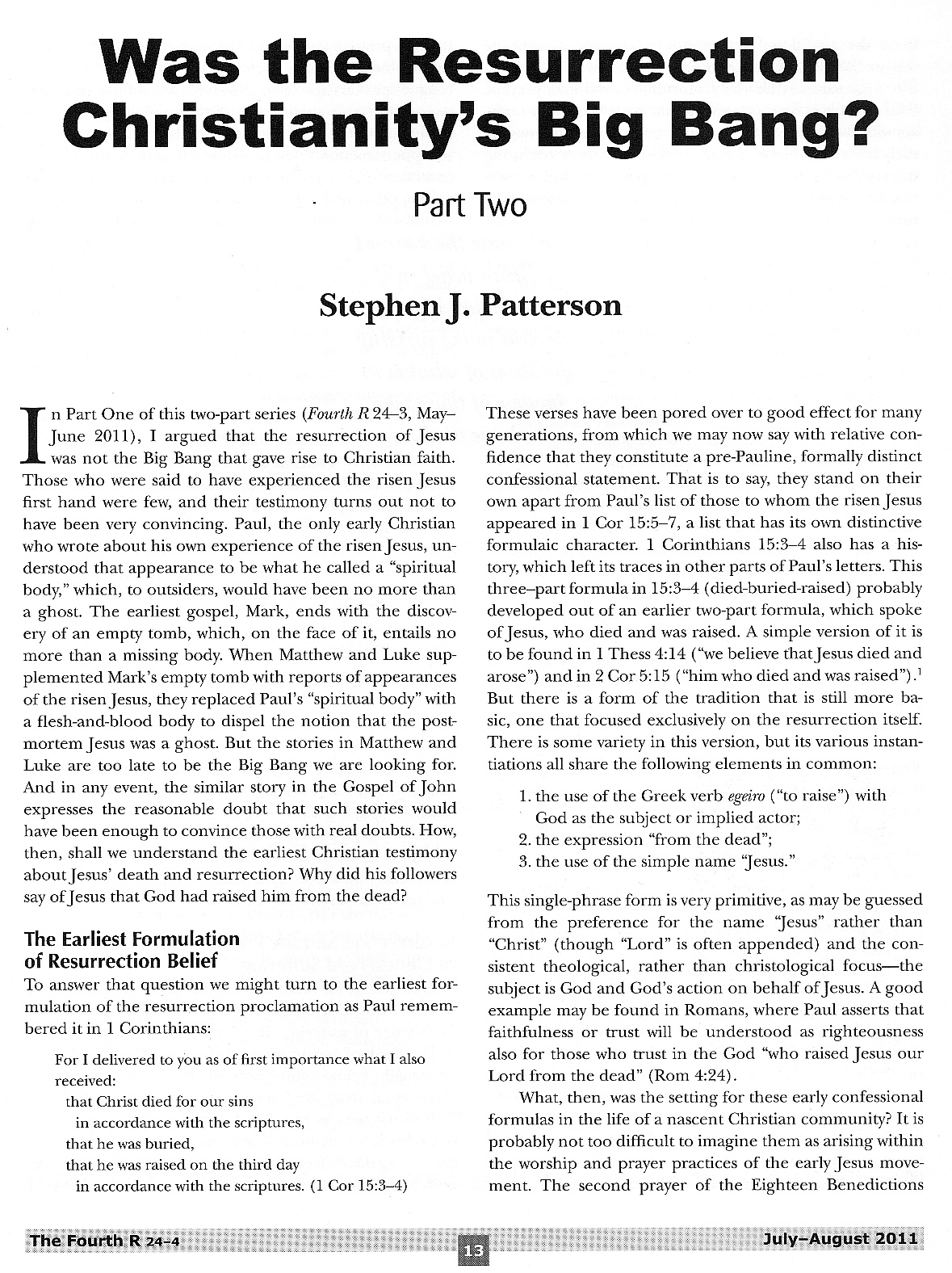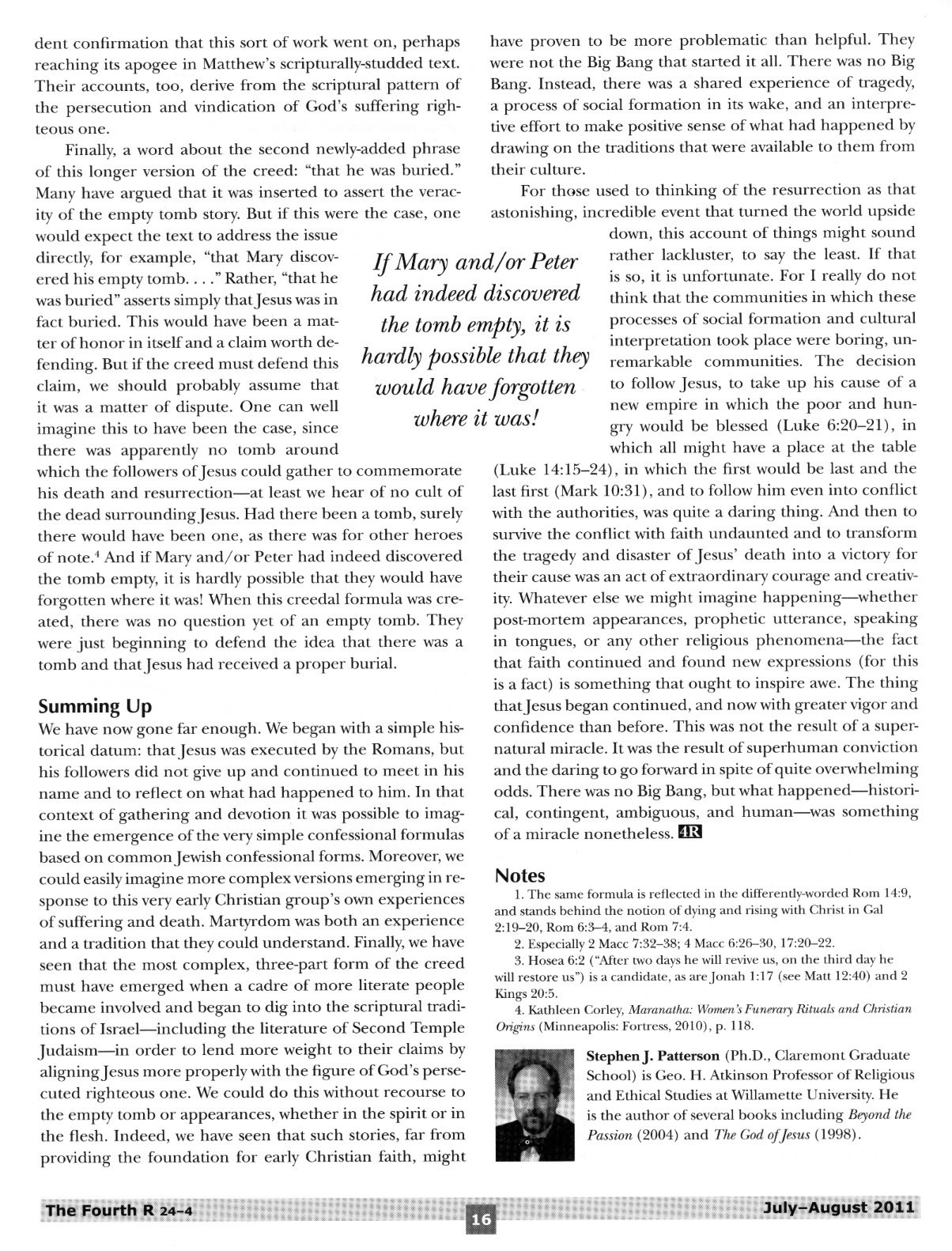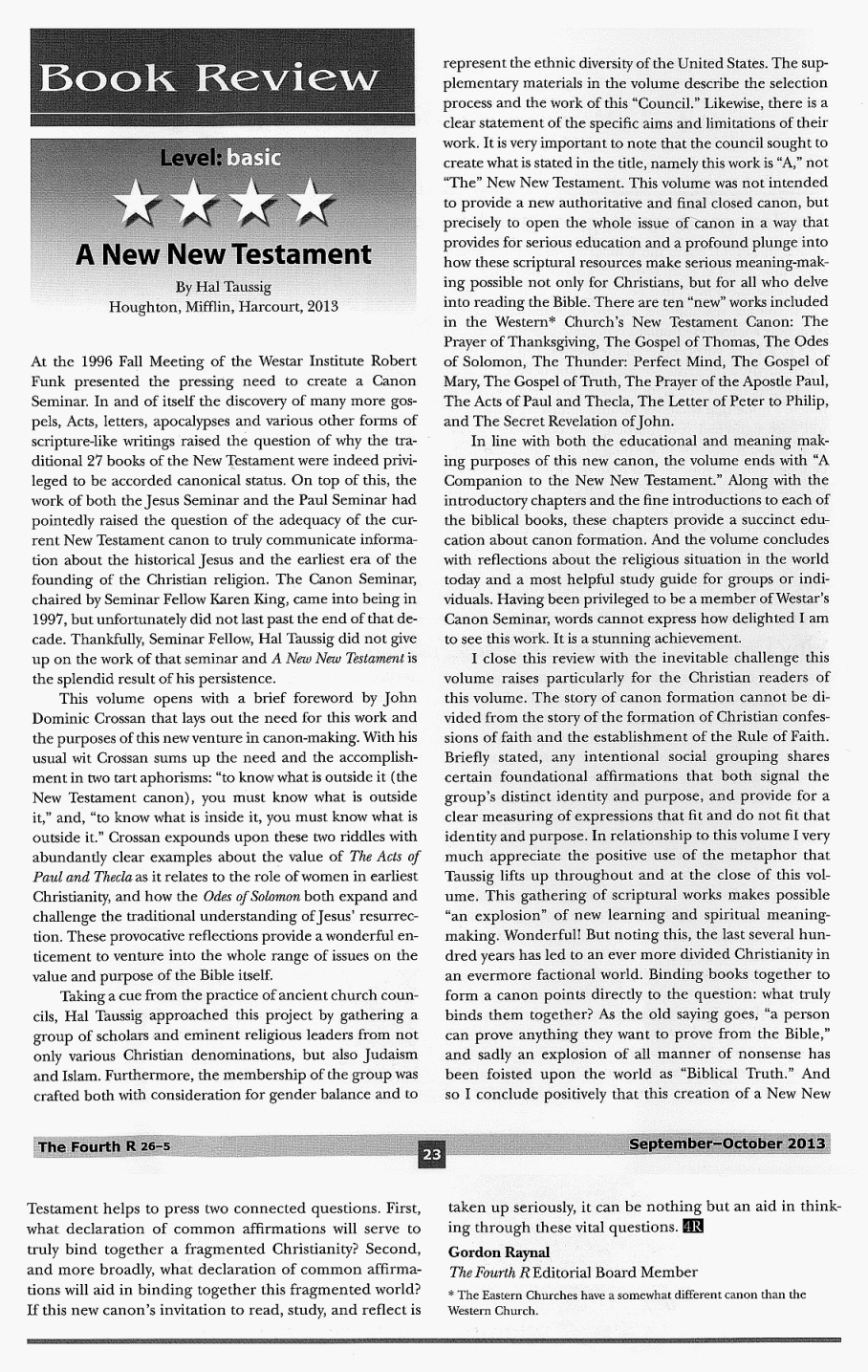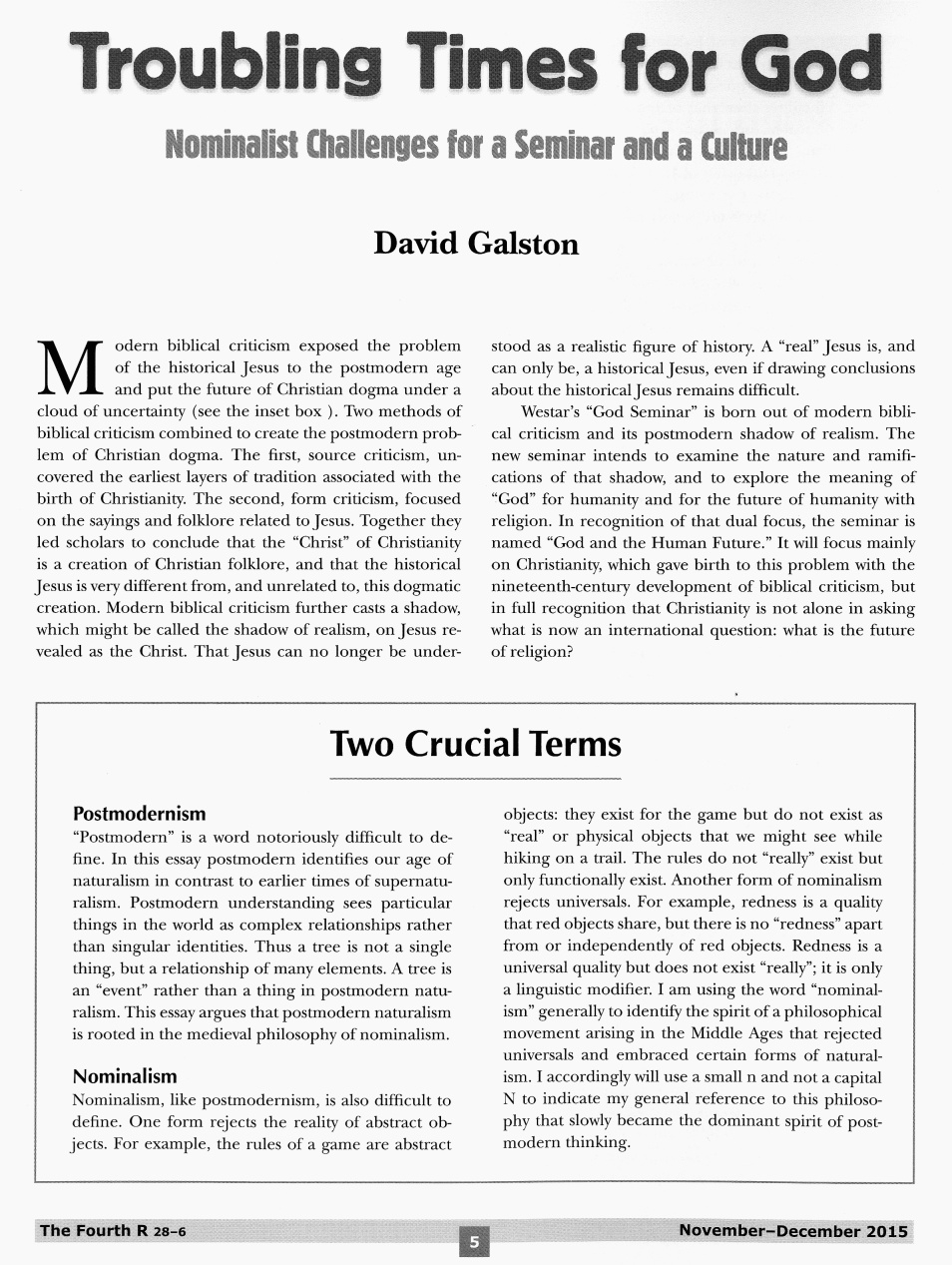The Fourth R (journal from Westar, home of Jesus Seminar)
|
|
This post was updated on .
Along with "reading, 'riting and 'rithmetic" religion is the fourth "R" of basic literacy. Since 1987, Westar's popular magazine The Fourth R has published the latest thinking from religion scholars and writers — in non-technical language aimed at a literate general audience. The Fourth R also includes early reports on Westar Seminar deliberations and the latest news on Westar events and programs.
Annual subscription to The Fourth R is included in Westar membership. http://www.westarinstitute.org/resources/more-about-the-fourth-r/ |
|
|
This post was updated on .
A good article in 2 parts. I have scanned just the first and last page of the second part. These have summarized very well the main theme of the article.
The Fourth R, July-August 2011, p13, p16  
|
|
|
In reply to this post by Alex
Demoting Jesus
On Returning His Humanity David Galston The Fourth R September-October 2012, 25-5, pp15-18, 26 4R1209p15.jpg 4R1209pp16-17.jpg 4R1209p18.jpg 4R1209p26.jpg |
|
|
In reply to this post by Alex
Reading the Bible Crticially, Not Literally
A Primer Paul H Jones The Fourth R November-December 2012, 25-6, pp11-18 Why I Wrote Embracing the Human Jesus David Galston The Fourth R November-December 2012, 25-6, pp19-20, 24 4R1211p11.jpg 4R1211pp12-13.jpg 4R1211pp14-15.jpg 4R1211pp16-17.jpg 4R1211pp18-19.jpg 4R1211p20.jpg 4R1211p24.jpg |
|
|
This post was updated on .
In reply to this post by Alex
What Comes after Christianity?
Thomas Sheehan From The Fourth R Volume 26, Issue 5 September/October 2013 http://www.westarinstitute.org/resources/the-fourth-r/what-comes-after-christianity 1. Yeshua Christianity is an epic mistake and a scandalous inversion of the prophet’s message. To put it in a phrase: Yeshua preached the kingdom of God whereas Christianity preached that he was the kingdom of God in person. Christianity turned the messenger into the message by claiming that Yeshua preached himself as the center of the good news. Yeshua’s proclamation of God’s kingdom was focused on ordinary people and how they might live and die. Christianity, on the other hand, is focused on an extraordinary individual and on how he lived and died. Yeshua preached a new way of life without a messiah, whereas Christianity turned Yeshua into the messiah who rules the world. In a word, turning the messenger into the message is the original sin of Christianity. 2. “Resurrection” Let us go back to the earliest mention of the “resurrection.” That happens around the year 50, two decades after the death of Yeshua, in the earliest Christian scripture we have, Paul’s First Letter to the Thessalonians. Except that in this earliest text Paul does not proclaim the “resurrection” of Yeshua—this is a mistranslation that came centuries later—but instead he speaks metaphorically, not historically, of God “awakening” Yeshua from the sleep of death. 3. God Yeshua was not about the Christ, not even about God in heaven—because his God was entirely about human beings on earth, enacting justice and mercy—that alone defined his God. What comes after Christianity? The theologians tell us: God does. But what kind of God? For that we ask: What came before Christianity? And it was not Yeshua but Yeshua’s word. He tells us that what comes before Christianity is a God who gently but firmly pushes us away from himself in the direction of each other. The second-century Church father Irenaeus wrote in Latin “Gloria dei homo vivens,” that is, the glory of God—everything that religion claims to be about—is human beings living humanly and humanely. If you believe in God, fine: that God pushes you away from himself and on to each other. If you don’t believe in God, no matter. The task remains the same. Thomas Sheehan is Professor, Department of Religious Studies, Stanford University and the author of several books, including Becoming Heidegger (2007) and The First Coming: How the Kingdom of God Became Christianity (1986), a widely acclaimed and controversial account of Easter. |
|
|
This post was updated on .
In reply to this post by Alex
Religious Naturalism
and Its Place in the Family of Religions Donald A Crosby Volume 27, Issue 1, January-February 2014 The Fourth R http://www.westarinstitute.org/resources/the-fourth-r/religious-naturalism/ RN_4R2014.jpg RN_4R2014_2.jpg RN_4R2014_3.jpg RN_4R2014_4.jpg RN_4R2014_5.jpg |
|
|
In reply to this post by Alex
Milestones in the Quest for the Historical Jesus
Robert W Funk The Fourth R 26-6, Nov-Dec 2013  Alex's comment: More than two hundred years of the Quest summerized in less than 2 pages! Only Funk, perhaps the "father" of the current modern Quest, can do it. |
|
|
In reply to this post by Alex
Book Review: A New New Testament
The Fourth R 26-5, Sep-Oct 2013 
|
|
|
This post was updated on .
In reply to this post by Alex
The Fourth R
Volume 27 Number 3, May-June 2014 Religion without God The Way of Religious Naturalism Michael Hogue, Associate Professor of Theology, Meadville Lombard Theological School, Chicago Cover.jpg 3.jpg 4-5.jpg 6.jpg 15.jpg 16.jpg Fact-Checking Faith From Category Confusion to "Higher" Truth Paul H. Jones, Professor of Religion, Transylvania University in Lexington, Kentucky 7.jpg 8-9.jpg 10-11.jpg 18-19.jpg 20.jpg Yahweh-the God who changed his ways Charles Hedrick 21.jpg |
|
|
In reply to this post by Alex
Easter, Apocalypse, and the Fundamentalists
Thomas Sheehan Professor, Department of Religious Studies, Stanford University Professor Emeritus, Loyola University, Chicago The Fourth R, volume 28, number 3, May-June 2015, page 3 ...Fundamentalist scholars like [N.T.] Wright 1. fail to seriously identify apocalyptic as a literary genre expressing a peculiar worldview, one that framed proto-theological claims about the historical and meta-historical status of Jesus 2. they fail to see that apocalyptic is a culturally conditioned and historically contingent genre with its own store of literary tropes, including resurrection 3. they fail to understand that, while the literary figures of the apocalyptic genre were the de facto matrix of early Christianity, they are not de jure normative for expressing Christian faith To put it positively, apocalyptic is 1. a literary genre 2. tied to the culture of late Second Temple Judaism 3. that provided the earliest images and language for expressing Christian faith... |
|
|
In reply to this post by Alex
Don Cupitt's Creative Faith
Lloyd Geering The Fourth R, volume 28 number 4, July-August 2015, pp6-8 "...Sea of Faith Network...now numbers some two thousand supporters worldwide, publishes its own journal, and holds regular annual conferences..." "In 1995 his book Solar Ethics introduced a phrase that he often used thereafter to describe his ideal way of living, one he believed to be consistent with the teaching and example of Jesus. Just as the life of the sun consists of burning itself out by distributing its energy far afield in the form of light and heat, so we should practice solar living by devoting our minds and our energy to the 'ecohumanism of the future' until we are exhausted." "In his latest book, Creative Faith, Don sets out to show that his version of solar living was much the same as what was taught by Jesus and has been present within Christianity from its very outset, but only in modern times has been freed from the supernatural belief structure that long obscured it." "'First of all, Jesus was not the divine figure he has long been taken to be. He did not perform nature miracles. He was a moral teacher, a sage, whose insights into the human condition and human relationships contrasted very strongly with the teaching of the traditional Jewish leaders. He had a vision of a new kind of society that he referred to as the kingdom of God. But he did not promote himself as its king, and in fact did not talk much about God.'" "...Creative imagination soon transformed their [Jesus' followers] memories of Jesus into the Christ, now glorified at the centre of a mythical supernatural world. This quickly expanded, largely through the work of Paul, who because he had never known Jesus in the flesh, was completely free to use his imagination in laying the foundations of what became orthodox Christian teaching. We see his imagination clearly at work in 1 Thessalonians, now recognized as the earliest book in the New Testament." Don_Cupitt_s_Creative_Faith_scan_1.jpg Don_Cupitt_s_Creative_Faith_scan_2.jpg |
|
|
In reply to this post by Alex
(first page only)

|
|
|
In reply to this post by Alex
Westar Institute National Meeting 16-19 March 2016
Flamingo Resort Hotel, Santa Rosa, California http://www.westarinstitute.org/national-meetings/spring-2016 John D. Caputo Does the Kingdom of God Need God? Thursday, 9 am The name of God is not that of a supreme being. It is instead the name of something unconditional without power, of a powerless power—a weak force with no army to back it up, like a kiss of peace rather than a sword. The kingdom of God is a kingdom without a royal monarch. Thus, the image of the Son of Man coming to judge the nations is, in theologian Paul Tillich’s words, half-blasphemous. The kingdom of God does not need God, but, according to Jack Caputo, this theological atheism does not spell the end of God’s kingdom; rather it dispels the misunderstanding of the gospel and preserves what is good about the good news. It opens the door to understanding the coming of the kingdom of God in terms other than power, and to understanding power—God’s power or anyone else’s—differently. John D. Caputo (Ph.D., Bryn Mawr College) is the Watson Professor of Religion Emeritus at Syracuse University and the Cook Professor of Philosophy Emeritus at Villanova University. A hybrid philosopher/ theologian who works in the area of radical theology, Caputo has spearheaded a notion he calls “weak theology,” which is set forth in his The Insistence of God (2013) and The Weakness of God (2006), winner of the American Academy of Religion award for excellence in constructive theology. He has recently published The Folly of God (Polebridge, 2015) and Hoping Against Hope (Fortress, 2015) and is currently working on A Pelican Guide to Hermeneutics for Penguin Press. Dennis R. MacDonald Mythologizing Jesus The Case of the Anointing Woman Thursday, 1 pm Scholars long have recognized that New Testament depictions of Jesus witness to a creative explosion of stories about him. Few interpreters, however, have recognized that many, if not most, of these stories have analogies in classical Greek literature, especially in Homer’s Iliad and Odyssey. The story of the woman who anointed Jesus at Bethany, for example, imitates book 19 of the Odyssey. According to Dennis MacDonald, the implications are profound. First, Mark apparently did not inherit the anointing tale from tradition but created it to rival Homer. Second, parallels to the story in Luke and John do not represent an independent tradition. Third and most significantly, this analysis suggests that the evangelist expected his readers to be sufficiently familiar with the Odyssey to detect the imitation. Dennis R. MacDonald (Ph.D., Harvard University) retired as John Wesley Professor of New Testament and Christian Origins at the Claremont School of Theology where he now serves as a Research Professor. The former director of the Institute for Antiquity and Christianity at Claremont Graduate University, he also served as visiting scholar at Harvard Divinity School and at Union Theological Seminary. MacDonald has appeared on A&E, PBS and the History Channel. He is the author of many books, including The Homeric Epics and the Gospel of Mark (2000), The Gospels and Homer (2014), Mythologizing Jesus (2015), and How Did Mark Know about Jesus? (forthcoming). |
|
|
This post was updated on .
In reply to this post by Alex
The Fourth R magazine
Volume 30 Number 4 July-August 2017 page 21 4R_July_2017.jpg Alex's comment: It is a sincere attempt to render the Ten Commandments relevant to modern life again. |
|
|
In reply to this post by Alex
A Manifesto for Progressive Christians
Les Switzer The Fourth R Volume 30 Number 5 September-October 2017 pp. 19-20 Progressive_Christian_Manifesto_4R_Sep_2017_v30n5.jpg |
|
|
In reply to this post by Alex
How Humans Made God
Lloyd Geering The Fourth R Volume 30 Number 6 November-December 2017 pp. 5-9, 21-22 scanned partially (due to copyright): Geering_4R_2017_1.jpg Geering_4R_2017_2.jpg |
|
|
In reply to this post by Alex
What is Death of God theology?
Daniel J. Peterson Volume 32 Number 2, March-April 2019 "I divide death of God theology into three categeoris: the kenotic, the humanistic, and the prothetic" "The word 'kenotic' comes from the Greek adjective kenos, meaning "empty." "Death of God theologians deny the transcendence of God, affirming life in this world, seek the presence of God among us, and bear a commitment to engaging secular culture." "Now that God has died, members of the Christian faith must do God's work in the world by living for others." "The radical prophetic theologian does what the prophets of biblical religion have always done: interrogates God, holds God accountable, and in the case of Rubenstein, renounces and replaces "God" in the name of values (justice, compassion, love) historically associatd with God." |
|
|
In reply to this post by Alex
What's Wrong with Classical Theism?
Clayton Crockett Volume 52 Number 4, July-August 2019 "It is not credible in scientific terms to continue to imagine God as a Very Big Person." |
|
|
In reply to this post by Alex
Homo Religiosus
The place of religion in human experience Dominic Kirkham The Fourth R, Volume 32 Number 6 November-December 2019 (adapted from Our Shadowed World by Dominic Kirkham (Cascade Books/Westar Studies, 2019)) ...The appearance of what we now call secularism has enabled us to refocus on what had been the most challenging and subversive element of the life of Jesus: the radical and indeed subversive nature of his moral teachings that had been obscured by the demands of a ritualised Christianity that was concerned with the nature of his personality and embellished by a Neo-Platonist theology. This shift of focus has enabled us to rediscover the intrinsically humanistic nature of the teaching of Jesus. ... ...Looking back we can now see that the secularism of the Enlightenment has enabled us to rediscover what was truly revolutionary about the teaching of the historical Jesus, namely, the degree to which he emphasised the purely humanitarian basis of ethics. His radical demand that we should not only love our neighbours as ourselves but also love our enemies and do good to those who hate us have rarely been adhered to, yet are the touchstone of his teaching. And his moral system referred not to some supernatural destiny, but to everyday life. The distinctive charateristic of such living is its internalised morality, which is independent of authority and respects the dignity of all others. This challenging but noble ethic has in our secular age become the basis of our modern understanding of human rights. ... |
|
|
This post was updated on .
In reply to this post by Alex
Religion Promises but Science Delivers
Don Braxton The Fourth R May-June 2021, 34-3, pp3-9, 16 4R2105p3.jpg 4R2105pp4-5.jpg 4R2105pp6-7.jpg 4R2105pp8-9.jpg 4R2105p16.jpg |
«
Return to Western religions 西方宗教
|
1 view|%1 views
| Free forum by Nabble | Edit this page |

